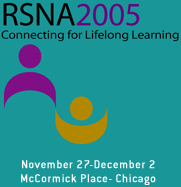
Abstract Archives of the RSNA, 2005
Amita Sharma MBBS, Abstract Co-Author: Nothing to Disclose
Michael Lanuti MD, Abstract Co-Author: Nothing to Disclose
JoAnne Martino RN, Abstract Co-Author: Nothing to Disclose
Subba Rao Digumarthy MD, Abstract Co-Author: Nothing to Disclose
Michael M. Maher MD, Abstract Co-Author: Nothing to Disclose
Jo-Anne O'Malley Shepard MD, Presenter: Nothing to Disclose
To evaluate the technique and short term complications of radiofrequency ablation of lung cancers.
16 consecutive patients (M: F 6:10, mean age 68.8+/- 11.9 years) with significant multiple co-morbid conditions underwent 18 sessions of CT guided radio-frequency ablation for malignant tumors of the lung ( 11 NSCLC and 5 metastasis, mean size 2.7+/-1.4 cm ) over a period of 22 months. A single electrode was used in 10 and a cluster electrode in 8 treatments (Radionics, Burlington, MA) with the aim to cure in 11 and palliation in 5 patients. Lesion size range in the curative group was 0.9 cm – 3.2 cm and in the palliative group 2.7 cm – 6.0 cm. The procedure was done under general anesthesia in 7 and under conscious sedation in 11 sessions. All the patients were hospitalized (mean stay 1.3, SD 0.8 days). Post-procedure patients were followed on daily basis by a interventional radiology nurse for atleast two weeks and longer if necessary for development of new symptoms and worsening of existing symptoms. Additional CT scans of chest were performed when required.
Treatment could be completed successfully in all the sessions. The post procedure complications were intense diaphoresis during procedure (18/18), transient fatigue lasting up to 4 weeks ( 11/18), transient chest wall pain responsive to NSAIDS and /or narcotics (8/18) , blood streaked sputum (4), fever (2/18), pneumonia (2/18), transient neuropathy (2/18), pneumothorax(1/18), chest tube (1/18) , small pleural effusion (1/18) and self limited extra pleural hematoma (1/18). Only 1 patient with emphysema required additional intervention of chest tube placement for pneumothorax. No other major complications were observed. The complications relating to general anesthesia included urinary retention (1/ 7) and aspiration pneumonia (1/7). One patient treated under conscious sedation developed nausea and vomiting related to narcotic analgesia.
Radio-frequency ablation of lung tumors is a safe and feasible procedure even in patients with significant co-morbid conditions. Diaphoresis during treatment, transient fatigue and chest wall pain are the most common complications within the first month.
Sharma, A,
Lanuti, M,
Martino, J,
Digumarthy, S,
Maher, M,
Shepard, J,
Evaluating the Technique and Short-term Complications of Radiofrequency Ablation of Lung Cancers. Radiological Society of North America 2005 Scientific Assembly and Annual Meeting, November 27 - December 2, 2005 ,Chicago IL.
http://archive.rsna.org/2005/4417009.html

